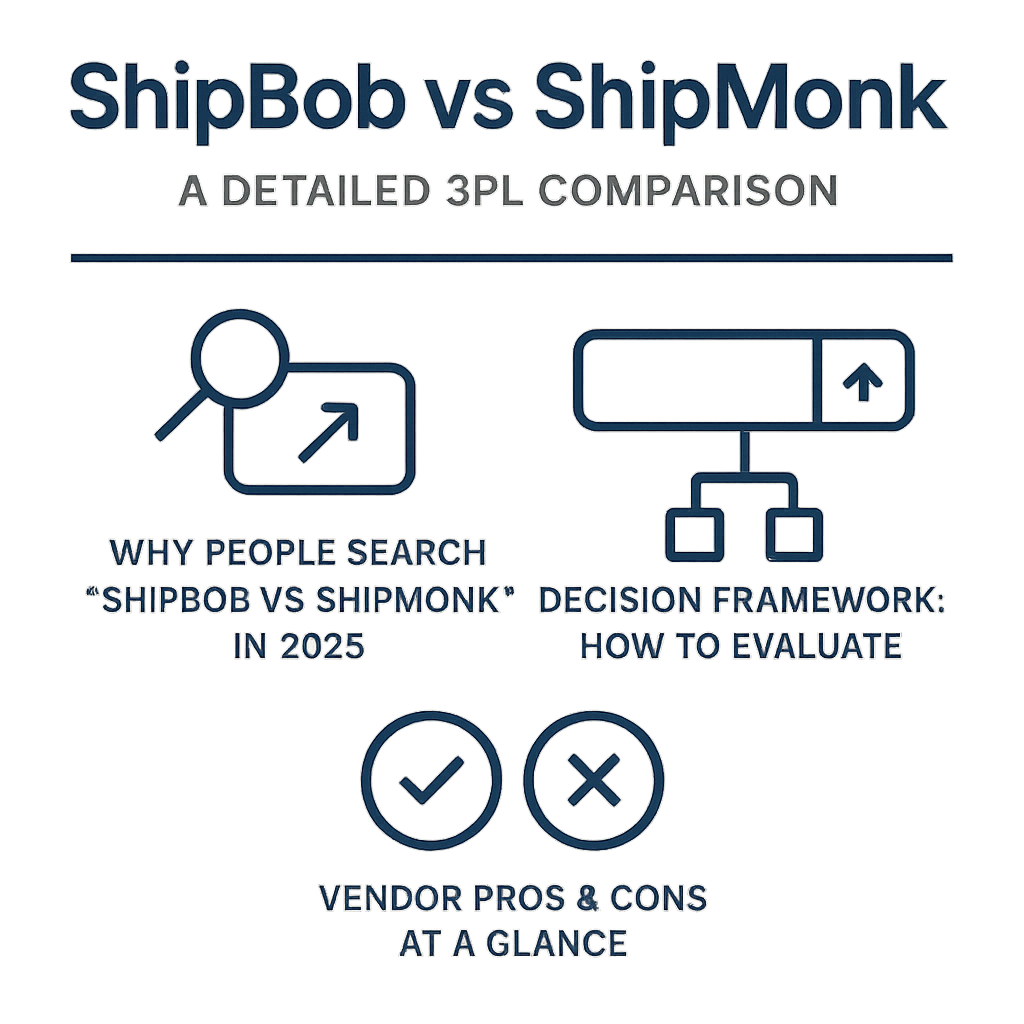
ShipBob vs ShipMonk
As a logistics manager or ecommerce founder, choosing the right third-party logistics (3PL) provider can feel daunting. With options like ShipBob and ShipMonk, each offering unique benefits, how do you decide? This article will guide you through a comprehensive comparison of ShipBob vs ShipMonk, helping you make a confident decision.
Why People Search ‘ShipBob vs ShipMonk’ in 2025
In 2025, the logistics landscape is more complex than ever, with AI forecasting and sustainability taking center stage. Businesses are increasingly looking for 3PLs that not only offer robust fulfillment solutions but also align with their values and technological needs. ShipBob and ShipMonk have emerged as key players, each with strengths that appeal to different business models. As ecommerce continues to grow, the demand for efficient, reliable, and scalable logistics solutions becomes critical. Understanding the nuances between ShipBob and ShipMonk can significantly impact your operational efficiency and customer satisfaction.
- Consider how each provider’s technology stack integrates with your existing systems.
- Evaluate their sustainability initiatives if environmental impact is a priority for your brand.
- Assess their scalability to ensure they can grow with your business demands.
Decision Framework: How to Evaluate
When evaluating ShipBob vs ShipMonk, it’s crucial to align their offerings with your business needs. Start by identifying your primary logistics challenges—be it cost, speed, or coverage. Each provider has unique strengths that may align differently with your priorities. For instance, if rapid fulfillment is your top priority, consider which provider offers the best transit times and warehouse locations relative to your customer base.
Next, consider the level of customer support you require. ShipBob and ShipMonk offer varying degrees of support models, which can affect your operational efficiency. Additionally, examine their technology integrations and how they fit with your ecommerce platforms.
- Map out your logistics priorities: speed, cost, or coverage.
- Evaluate the support model each provider offers and its impact on your operations.
- Check compatibility with your existing ecommerce platforms and tech stack.
Vendor Pros & Cons at a Glance
- ShipBob Pros: Extensive warehouse network, robust tech integrations, strong customer service.
- ShipBob Cons: Higher cost for small businesses, complex onboarding process.
- ShipMonk Pros: Competitive pricing, flexible service options, strong small-business support.
- ShipMonk Cons: Limited international reach, fewer tech integrations.
ShipBob’s extensive network and tech capabilities make it ideal for rapidly scaling businesses, while ShipMonk’s competitive pricing and flexibility are attractive to smaller operations. Consider your growth trajectory and tech needs when choosing between them.
Pricing & Total Landed Cost: What Really Moves the Number
Understanding the pricing structures of ShipBob and ShipMonk is essential for calculating your total logistics costs. ShipBob typically offers a more comprehensive service package, which can result in higher costs, particularly for smaller businesses. However, their pricing often includes value-added services that can streamline operations. ShipMonk, on the other hand, provides more flexible pricing options that cater to smaller businesses, though this may come with trade-offs in service breadth.
- ShipBob’s pricing includes comprehensive services, which can be cost-effective for larger volumes.
- ShipMonk offers more flexible pricing, ideal for startups and smaller businesses.
- Consider the total cost of ownership, including hidden fees and service add-ons.
Feature-by-Feature Comparison
- Warehouse Network: ShipBob offers a wider network, beneficial for national coverage; ShipMonk focuses on strategic locations for cost efficiency.
- Technology Integration: ShipBob excels in tech integrations with major ecommerce platforms; ShipMonk offers essential integrations but fewer options.
- Customer Support: ShipBob provides dedicated account managers; ShipMonk offers robust support but may lack dedicated resources.
- International Shipping: ShipBob has a stronger international presence; ShipMonk is more focused on domestic markets.
ShipBob’s network and tech integrations make it a strong choice for businesses aiming for rapid scaling and international reach. ShipMonk’s focus on cost efficiency and essential services suits smaller, domestically-focused businesses.
Scenario Playbook: Who Should Choose What?
- High-Growth Startups: Choose ShipBob for its scalability and tech integrations.
- Small to Medium Enterprises: ShipMonk’s flexible pricing and support are ideal.
- International Expansion: ShipBob’s global reach is advantageous.
- Cost-Conscious Operations: ShipMonk offers competitive pricing with essential services.
Onboarding & Risk Mitigation
Onboarding with a 3PL can be a complex process, and both ShipBob and ShipMonk offer structured onboarding programs. ShipBob’s process may be more intensive due to its extensive service offerings, which can be beneficial for businesses with complex needs. ShipMonk’s onboarding is typically faster and more straightforward, making it attractive for businesses looking to start quickly. Risk mitigation strategies should include clear communication of expectations and regular performance reviews to ensure service levels meet your standards.
Expert Take
Having worked with both ShipBob and ShipMonk, I can attest to their unique strengths. One ecommerce client, a rapidly growing fashion brand, chose ShipBob for its tech integrations and scalability, which supported their international expansion. However, a smaller skincare startup found ShipMonk’s flexible pricing and excellent customer support more aligned with their needs. The key is to match your business priorities with the strengths of each provider.
Further Reading
FAQs
How do pricing models differ for ‘ShipBob vs ShipMonk’?
ShipBob typically offers a more comprehensive service package, which can be more expensive, while ShipMonk provides flexible pricing options suitable for smaller businesses.
What support model should I expect?
ShipBob offers dedicated account managers for personalized support, whereas ShipMonk provides robust general support without dedicated resources.
Which industries benefit most?
High-growth startups and international businesses may benefit more from ShipBob, while small to medium enterprises might find ShipMonk’s offerings more suitable.
How long does onboarding take?
ShipBob’s onboarding process is more intensive, potentially taking longer, while ShipMonk’s process is typically quicker and more straightforward.
Can multi-node reduce both cost and transit time?
Yes, utilizing a multi-node strategy with either provider can optimize costs and reduce transit times by distributing inventory closer to customers.
Next Steps
Ready to make a decision? Compare quotes from ShipBob and ShipMonk or schedule a consultation to discuss your logistics needs in detail.

Leave a Reply